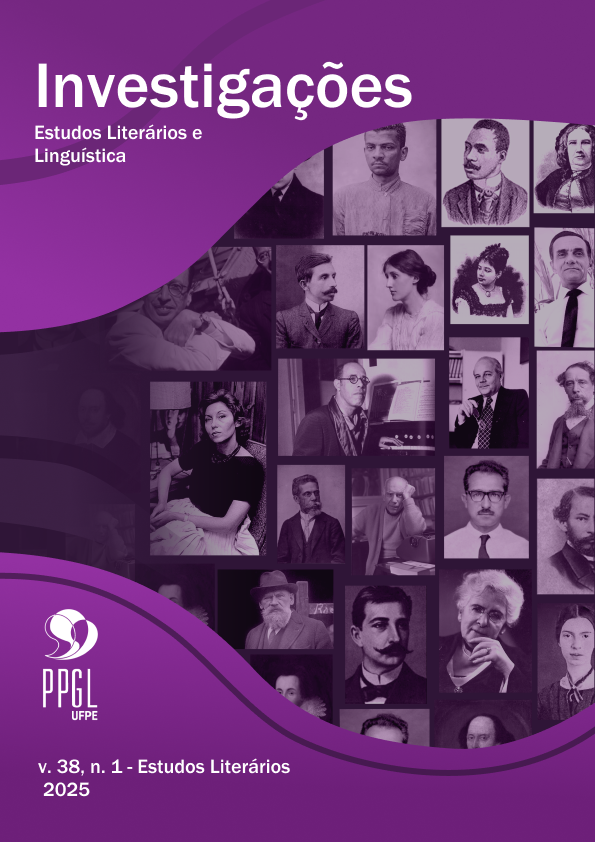Narrative identity, by Paul Ricoeur, as an explanation of the notion of formation in the Bildungsroman as understood by Mikhail Bakhtin
DOI:
https://doi.org/10.51359/2175-294x.2025.262227Keywords:
coming-of-age, narrative identity, Ricoeur, BakhtinAbstract
This article starts from Mikhail Bakhtin's well-known essay on the Bildungsroman to confront his ideas about the representation, by this novelistic genre, of the formation of man, with Paul Ricoeur's concept of narrative identity. The French philosopher understands the narrative as the only possibility of constituting the subject's identity, which can be extended to the way in which the Bildungsroman, the novel of formation, seeks to show the constitution of the characters' character. The dialectic between sameness and ipseity explains the ways in which this genre configures itself as a narrative.
References
BAKHTIN, Mikhail. Teoria do romance I: a estilística. Tradução de Paulo Bezerra. São Paulo: Editora 34, 2015.
BAKHTIN, Mikhail. Estética da criação verbal. Tradução de Paulo Bezerra. 4. ed., São Paulo: Martins Fontes, 2003.
BARROS, Diana Luz Pessoa de. Teoria semiótica do texto. São Paulo: Editora Ática, 2005.
BERGSON, Henri. A evolução criadora. Tradução de Adolfo Casais Monteiro. São Paulo: Unesp, 2010.
DILTHEY, Wilhelm. Poetry and experience. Edicted by Rudolf A. Makkreel and Frithjof Rodi. Princeton, New Jersey: Princeton University Press, 1985.
FOUCAULT, Michel. A coragem da verdade: o governo de si e dos outros. II: curso no Collège de France (1983-1984). Tradução de Eduardo Brandão. São Paulo: WWF Martins Fontes, 2011.
GALLAGHER, Katherine. Ficção. In: MORETTI, Franco. O romance 1: a cultura do romance. Tradução de Denise Bottmann. São Paulo: Cosacnaify, 2009.
HEGEL, Georg. W. F. Fenomenologia do espírito. Tradução de Paulo Meneses com a colaboração de Karl Heinz-Efken. 2. ed., Petrópolis: Vozes, 1992.
HEIDEGGER, Martin. Ser e tempo. Tradução de Márcia Sá Cavalcanti Schuback. 7. ed., Petrópolis, RJ: Editora Vozes; Bragança Paulista: Editora Universitária São Francisco, 2012.
HEIDEGGER, Martin. A tese de Kant sobre o ser. In: HEIDEGGER, Martin. Heidegger. Tradução de Ermildo Stein. São Paulo: Editora Nova Cultural, 1996. Coleção Os Pensadores.
LUKÁCS, Georg. A teoria do romance: um ensaio histórico-filosófico sobre as formas da grande épica. Tradução de José Marcos Mariani de Macedo. São Paulo: Duas Cidades; Ed. 34, 2000.
MILLER, Meredith. Lesbian, gay and trans Bildungsromane. In: GRAHAM, Sarah. (Org.) A history of the Bildungsroman. Cambridge: Cambridge University Press, 2019, p. 239-266.
RICOEUR, Paul. O si-mesmo como um outro. Tradução de Lucy Moreira Cesar. Campinas: Papirus, 1991.
RICOEUR, Paul. Tempo e narrativa. Tradução de Cláudia Berliner e Márcia Valéria Martinez de Aguiar. São Paulo: WMF Martins Fontes, 2010.
VIANA, Cristina A. Tempo e sujeito em Paul Ricoeur: uma introdução a partir da leitura ricoeuriana do livro xi das Confissões de Santo Agostinho. Revista Contemplação, Porto Alegre, v. 1, p. 1-19, 2015.
Downloads
Published
How to Cite
Issue
Section
License
Copyright (c) 2025 Edson Ribeiro da Silva

This work is licensed under a Creative Commons Attribution 4.0 International License.
Authors who publish with Revista Investigações agree to the following terms:
Authors retain copyright and grant the journal right of first publication with the work simultaneously licensed under the Creative Commons Attribution 4.0 International (CC BY 4.0) license that allows others to share the work with an acknowledgement of the work's authorship and initial publication in this journal.
Authors are able to enter into separate, additional contractual arrangements for the non-exclusive distribution of the journal's published version of the work (e.g., post it to an institutional repository or publish it in a book), with an acknowledgement of its initial publication in this journal.
You are free to:
Share — copy and redistribute the material in any medium or format for any purpose, even commercially.
Adapt — remix, transform, and build upon the material for any purpose, even commercially.
The licensor cannot revoke these freedoms as long as you follow the license terms.
Under the following terms:
Attribution — You must give appropriate credit , provide a link to the license, and indicate if changes were made . You may do so in any reasonable manner, but not in any way that suggests the licensor endorses you or your use.
No additional restrictions — You may not apply legal terms or technological measures that legally restrict others from doing anything the license permits.

